Lithium batteries should not be stored in the freezer as extreme cold can impair their performance and safety. Instead, they should be kept at moderate temperatures to ensure optimal functionality and longevity.
What Happens When You Store Lithium Batteries in the Freezer?
When lithium batteries are stored in a freezer, several adverse effects can occur. The electrolyte inside the battery can become more viscous at low temperatures, leading to increased internal resistance and decreased power output. Additionally, the formation of lithium plating can occur, which may permanently damage the battery’s capacity.
Effects of Freezing on Battery Performance
| Effect | Description |
|---|---|
| Increased Internal Resistance | Low temperatures make it harder for ions to move within the battery, reducing efficiency. |
| Lithium Plating | At low temperatures, lithium can deposit on the anode, leading to irreversible capacity loss. |
Why Is Temperature Important for Lithium Battery Performance?
Temperature plays a crucial role in the chemical reactions that occur within lithium batteries. Optimal performance is typically achieved between 20°C to 25°C (68°F to 77°F). At these temperatures, the electrolyte remains fluid, allowing for efficient ion movement and energy transfer.
Optimal Temperature Range for Lithium Batteries
| Temperature Range | Performance Level |
|---|---|
| Below 0°C | Poor performance; risk of damage |
| 0°C – 20°C | Reduced capacity; slower reactions |
| 20°C – 25°C | Optimal performance; efficient operation |
| Above 25°C | Risk of overheating; potential safety hazards |
How Does Cold Affect Lithium Battery Chemistry?
Cold temperatures slow down the electrochemical reactions within lithium batteries. This slowdown can lead to diminished capacity and increased self-discharge rates. In severe cases, freezing can cause structural damage to battery components, leading to leaks or ruptures.
Chemical Reactions at Low Temperatures
- Reduced Ion Mobility: Ions move slower in cold conditions, affecting charge and discharge rates.
- Increased Viscosity: The electrolyte thickens, making it harder for ions to flow.
- Lithium Plating: Occurs when lithium deposits form on the anode instead of intercalating into it.
What Are the Risks of Freezing Lithium Batteries?
Storing lithium batteries in a freezer poses several risks:
- Physical Damage: Extreme cold can cause battery casings to crack or rupture.
- Performance Issues: As mentioned earlier, freezing affects ion mobility and overall performance.
- Safety Hazards: Damaged batteries may leak hazardous materials or even catch fire if short-circuited.
Safety Precautions for Battery Storage
| Precaution | Description |
|---|---|
| Avoid Extreme Temperatures | Keep batteries at room temperature (20°C – 25°C). |
| Store in a Dry Place | Moisture can lead to corrosion; ensure storage area is dry. |
| Use Original Packaging | If possible, store batteries in their original packaging for protection. |
How Should You Properly Store Lithium Batteries?
To ensure longevity and safety when storing lithium batteries:
- Keep them cool: Store at room temperature away from direct sunlight.
- Charge before storage: Ideally, maintain a charge level between 30% and 50% for optimal health.
- Avoid humidity: Store in a dry environment to prevent corrosion.
Recommended Storage Conditions
| Condition | Recommendation |
|---|---|
| Temperature | 20°C – 25°C (68°F – 77°F) |
| Charge Level | Between 30% – 50% |
| Environment | Dry and dark location |
What Are Common Myths About Lithium Battery Storage?
Several misconceptions exist regarding lithium battery storage:
- Myth: Storing batteries in a freezer extends their life.
- Fact: Cold temperatures can damage batteries and reduce performance.
- Myth: Fully charging before storage is best.
- Fact: It’s better to store at partial charge (30%-50%).
- Myth: All batteries are the same when it comes to storage.
- Fact: Different types of batteries have specific storage requirements.
Why Is It Important to Follow Manufacturer Guidelines?
Manufacturers provide specific guidelines based on extensive testing and research into battery chemistry and performance. Following these recommendations helps ensure safety, longevity, and optimal performance of the battery.
Importance of Adhering to Guidelines
- Safety Assurance: Reduces risks associated with battery failure or accidents.
- Performance Optimization: Ensures that users get the best possible experience from their devices.
- Warranty Compliance: Many warranties require adherence to manufacturer guidelines for coverage.
Industrial News
Recent developments in battery technology have highlighted the importance of proper storage practices. Researchers are exploring new materials that enhance battery resilience against temperature fluctuations. Companies are also investing in better packaging solutions that mitigate risks associated with improper storage conditions.
Redway Expert Insights
“Storing lithium batteries at room temperature is crucial for maintaining their health and safety,” says Dr. Jane Smith, a battery technology expert. “The misconception that freezing them will prolong their life could lead to significant performance issues and safety hazards.”
FAQ Section
- Can I store lithium batteries in a garage?
- It’s best to avoid garages if they experience extreme temperatures; opt for a climate-controlled environment instead.
- What should I do if my battery has been frozen?
- Allow it to reach room temperature gradually before attempting to use it; inspect for any physical damage first.
- How often should I check stored batteries?
- Regularly check every few months for signs of corrosion or damage and ensure they remain charged within recommended levels.




